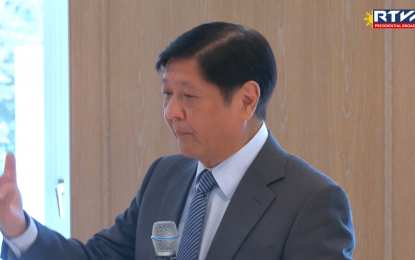[1.17] Marcos는 아시아 태평양이 냉전 사고 방식을 받아들이지 않을 것이라고 말했습니다.
컨텐츠 정보
- 21,118 조회
본문
MANILA – 아시아태평양 국가들은 "냉전" 사고방식을 수용하지 않고 성공의 길을 계획하고 있다고 "Ferdinand R. Marcos Jr." 대통령이 말했습니다. 월요일에 말했다.
"마르코스"는 성명을 발표하고 아시아 태평양 국가들이 이 지역의 치열한 지정학적 경쟁으로 인해 편을 들라는 "강한" 압력에 직면하고 있다고 지적했습니다.
그럼에도 불구하고 동남아시아국가연합(ASEAN)과 아시아태평양경제협력체(APEC) 회원국들은 냉전적 사고방식을 버리겠다는 생각에 전념하고 있다”고 “마르코스”는 말했다.
그는 스위스 다보스에서 필리핀 경제팀이 그와 필리핀 CEO를 위해 주최한 오찬에서 "한 쪽 또는 다른 쪽을 선택해야 하는 냉전 유형의 시나리오로 돌아가는 우리의 힘은 강하다"고 말했다. .
"저는 우리가 ASEAN과 인도 태평양, 인도 태평양 주변의 그룹으로서 결의가 있다고 생각합니다. 이 모든 갈등에도 불구하고 우리는 그것을 멀리하기로 결심했습니다."라고 Marcos는 덧붙였습니다.
냉전은 제2차 세계대전 직후 시작된 미국과 소련, 그리고 동맹국 간의 갈등 기간을 가리킨다.
Marcos는 아시아 태평양 지역이 어떤 국가에 의해 통제되지 않고 자신의 운명을 추구하는 데 초점을 맞추고 있다고 말했습니다.
“그리고 단순히 우리가 인도 태평양의 미래, 예를 들어 아시아 태평양의 미래는 아시아 태평양 국가 외에는 누구도 결정할 수 없다는 생각에 닻을 내리고 있기 때문에 선택해야 하고, 친구를 선택하고, 이웃을 선택하는 것, 그것이 우리가 할 선택입니다."라고 Marcos는 말했습니다.
Marcos는 약간의 혼란이 있지만 세계 경제는 여전히 세계화에 맞춰져 있다고 말했습니다.
현재 세계는 "여러 가지 큰 장애물"에 대처해야 하며, 국가들이 "국수주의, 국경 폐쇄, 보호주의"로 나아가는 경향이 있다고 덧붙였습니다.
“필리핀과 같은 국가가 일단 새로운 경제에 적응할 수 있도록 필요한 정책 요소, 입법 요소를 마련한 후 상황이 해결된 후의 경향이라고 생각합니다. 장소, 세계화가 시작될 것이라고 생각합니다. 우리는 세계화 경향으로 돌아가기 시작할 것입니다. 불가피하다고 생각한다"고 말했다.
'매우 강한' 무역 관계
"마르코스"는 코로나 바이러스 질병 2019 (Covid-19) 대유행과 러시아-우크라이나 분쟁과 같은 현재의 위기가 세계의 미래를 해치고 있음을 인정했습니다.
글로벌 도전을 극복하기 위해 "Marcos"는 세계 경제 간의 "매우 강력한"무역 관계가 "모든 국가의 부의 열쇠"라고 말했습니다.
그는 "다른 한 두 나라뿐 아니라 나머지 세계와 매우 강력한 무역 관계 없이는 어떤 나라도 부유하게 성장하지 못했다"고 말했다.
"마르코스" 필리핀은 코비드-19 대유행으로 국가가 기본으로 돌아간 점을 감안할 때 경제 강화를 목표로 하고 있다고 말했습니다.
"필리핀을 예로 들겠습니다... 팬데믹 동안 일어난 일은 우리가 기본에 충실한 상태로 돌아왔기 때문에 팬데믹과 같은 충격을 견딜 수 있도록 지역 경제를 강화해야 합니다. 미래의 우크라이나와 같은 것입니다." "Marcos"라고 말했습니다.
"그리고 그것의 중심 부분은 항상 사람들에게 우리 정부가 혼자서는 이것을 할 수 없다는 것을 지속적으로 상기시켜 왔습니다. 그리고 우리가 필요로 할 파트너십, 민간 부문과의 강력한 파트너십, 그리고 여기와 과거에 여러분이 존재하는 것, 많은 지원이 성공을 위한 기본 요소이자 가장 중요한 요소"라고 덧붙였습니다. (PNA)
This is the Original Article from PNA NEWS
[1.17] Marcos says Asia-Pacific won't embrace Cold War mindset
MANILA – Asia-Pacific nations are keen on charting their path to success without embracing the "Cold War" mentality, President "Ferdinand R. Marcos Jr." said on Monday.
"Marcos," issued the statement, as he noted that Asia-Pacific countries are facing "strong" pressure to take sides because of the intense geopolitical rivalry in the region.
Despite this, the Association of Southeast Asian Nations (ASEAN) and the Asia-Pacific Economic Cooperation (APEC) member economies are committed to the idea of abandoning the Cold War mindset, "Marcos," said.
"The forces of us going back to that Cold War type of scenario where you have to choose one side or the other is strong," he said during a luncheon hosted for him and Filipino chief executive officers by the Philippine economic team in Davos, Switzerland.
"I think we are determined as a group in ASEAN and in the Indo-Pacific, those around the Indo-Pacific, despite all of this conflict we are determined to stay away from that," "Marcos," added.
The Cold War refers to the period of conflict between the United States and the Soviet Union, as well as their respective allies, which began almost immediately after World War II.
The Asia-Pacific region, Marcos said, is focused on pursuing its destiny without being controlled by any country.
“And simply because we are anchored in the idea that the future of the Indo-Pacific, the future of Asia-Pacific for example cannot be determined by anyone but the countries of the Asia-Pacific and that removes us immediately from that idea that you must choose, we choose our friends, we choose our neighbors, that’s the choice that we will make," Marcos said.
Marcos said while there are some disruptions, world economies are still geared toward globalization.
For now, the world has to deal with "several big bumps on the road," Marcos said, adding that there are tendencies for nations to move "towards nationalism, towards closing borders, towards protectionism."
“I think the tendency after things have settled, after countries such as the Philippines, have put in place the elements of policy, the elements of legislation that are necessary to be able to adjust to what is the new coming economy, once that is in place, I think that the globalization will start. We will start to return to the tendency of globalization. I think it is inevitable," he said.
'Very strong' trade relations
"Marcos," acknowledged that the present crises such as the coronavirus disease 2019 (Covid-19) pandemic and the Russia-Ukraien conflict hurt the future of the world.
To overcome global challenges, "Marcos," said "very strong" trade ties among world economies are "key to wealth for any country."
"No country grew wealthy without a very strong trade relationship, not only with one or two other countries but with the rest of the world," he said.
The Philippines, "Marcos," said, aims to strengthen its economy, given that the Covid-19 pandemic brought the country back to the basics.
"I’ll use the Philippines as an example... What happened during the pandemic is that we were brought back with a hard thud to basics and so we have to strengthen our local economy to be able to withstand shocks such as the pandemic, such as Ukraine in the future," "Marcos," said.
"And a central part of that has always been my continuing reminder to people that we, the government, cannot do this alone. And the partnerships that we will need, a strong partnership with the private sector and your being here and in the past, have been so supportive is a primary element and most important element for that to succeed," he added. (PNA)
관련자료
-
이전
-
다음


